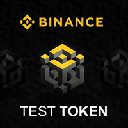-
 Bitcoin
Bitcoin $95,505.9541
-1.18% -
 Ethereum
Ethereum $2,779.6800
0.80% -
 XRP
XRP $2.5342
-2.00% -
 Tether USDt
Tether USDt $1.0001
0.00% -
 BNB
BNB $649.5352
-1.26% -
 Solana
Solana $166.9001
-3.84% -
 USDC
USDC $1.0000
-0.02% -
 Dogecoin
Dogecoin $0.2413
-1.61% -
 Cardano
Cardano $0.7629
-1.19% -
 TRON
TRON $0.2434
3.24% -
 Chainlink
Chainlink $17.4919
-1.14% -
 Avalanche
Avalanche $24.6445
-3.88% -
 Sui
Sui $3.2968
-3.65% -
 Stellar
Stellar $0.3276
-1.44% -
 Litecoin
Litecoin $127.5203
-0.44% -
 Toncoin
Toncoin $3.7490
2.25% -
 Shiba Inu
Shiba Inu $0.0...01540
-0.39% -
 UNUS SED LEO
UNUS SED LEO $9.7527
0.30% -
 Hedera
Hedera $0.2083
-3.05% -
 MANTRA
MANTRA $8.4029
11.40% -
 Hyperliquid
Hyperliquid $23.4368
-5.08% -
 Polkadot
Polkadot $4.9650
-1.69% -
 Bitcoin Cash
Bitcoin Cash $324.0772
1.16% -
 Bitget Token
Bitget Token $4.9686
1.17% -
 Ethena USDe
Ethena USDe $1.0004
0.09% -
 Uniswap
Uniswap $8.9661
0.37% -
 Dai
Dai $0.9999
-0.03% -
 Monero
Monero $233.1498
-0.91% -
 NEAR Protocol
NEAR Protocol $3.3661
-4.00% -
 Pepe
Pepe $0.0...09235
-3.91%
How to make money trading CoinEx contracts
CoinEx's contract trading platform empowers traders with leverage, margin trading, perpetual contracts, and advanced strategies to generate potential returns in the cryptocurrency market.
Nov 25, 2024 at 03:17 am

How to Make Money Trading CoinEx Contracts: A Comprehensive Guide
Introduction
CoinEx, a renowned cryptocurrency exchange, offers a comprehensive contract trading platform that provides traders with the opportunity to leverage their trading strategies and potentially generate substantial returns. This guide will delve into the intricacies of CoinEx contract trading, empowering you with the knowledge and insights to navigate this dynamic and lucrative market effectively.
Understanding CoinEx Contract Trading
1. What are CoinEx Contracts?
CoinEx contracts are financial instruments that derive their value from the underlying asset, typically a cryptocurrency. They allow traders to speculate on the price movements of these assets without actually owning them.
2. Contract Specifications
Each contract on CoinEx has specific characteristics such as:
- Contract size (e.g., 100,000 USDT)
- Price index (e.g., BTC/USDT)
- Funding rate (charged every 8 hours)
- Expiration date (when the contract expires)
3. Contract Types
CoinEx offers two main contract types:
- USDT-Margined Contracts: These contracts are margined using USDT.
- Coin-Margined Contracts: These contracts are margined using the underlying asset (e.g., BTC).
Step-by-Step Guide to Trading CoinEx Contracts
1. Create and Fund an Account
Begin by creating a CoinEx account and verifying your identity. Once your account is active, deposit funds to fund your trading account.
2. Choose a Contract
Select a contract that aligns with your trading strategy and risk tolerance. Consider factors such as the underlying asset, contract size, and expiration date.
3. Place an Order
Once you have selected a contract, determine your order type (e.g., limit order, market order). Specify the quantity and price of the order.
4. Manage Your Position
Monitor your open positions closely. Adjust your stop-loss and take-profit orders as needed to manage risk and optimize profits.
5. Close Your Position
When ready, close your position to realize your profits or losses. You can close your position by placing an order with the opposite side (e.g., selling after buying).
Advanced Concepts
1. Leverage and Margin Trading
CoinEx contracts allow you to use leverage, which amplifies your potential returns but also increases your risk. Margin trading involves borrowing funds to increase your purchasing power.
2. Funding Rate
The funding rate is a fee charged or paid to maintain open positions. It is determined by the supply and demand for the contract.
3. Perpetual Contracts
Perpetual contracts have no expiration date, allowing traders to hold positions indefinitely. However, they do have a funding rate.
4. Trading Strategies
Effective contract trading requires a well-defined trading strategy. Common strategies include scalping, trend following, and range trading.
Tips for Success
- Understand Risk: Contract trading involves significant risk. Only trade with funds you can afford to lose.
- Educate Yourself: Dedicate time to learning about contract trading concepts, strategies, and risk management.
- Practice: Use a demo account to practice trading before risking real funds.
- Monitor the Market: Stay abreast of market news and price movements affecting the underlying asset.
- Control Your Emotions: Avoid making impulsive trades based on emotions. Stick to your trading plan.
- Trade Responsibly: Manage your positions carefully, set realistic profit and loss targets, and adhere to sound risk management principles.
Disclaimer:info@kdj.com
The information provided is not trading advice. kdj.com does not assume any responsibility for any investments made based on the information provided in this article. Cryptocurrencies are highly volatile and it is highly recommended that you invest with caution after thorough research!
If you believe that the content used on this website infringes your copyright, please contact us immediately (info@kdj.com) and we will delete it promptly.
- Remittix (RTX) Leads the PayFi Revolution With Support From Ethereum (ETH) and Bitcoin (BTC) Whales
- 2025-02-23 23:10:26
- XRP vs. Bitcoin: The Debate Over Direct Promotion Unfolds in the Crypto Community
- 2025-02-23 23:10:26
- Rollblock (RBLK) Presale: A Superior Investment Opportunity to Solana (SOL) and XRP
- 2025-02-23 23:10:26
- BitLemons ($BLEM): The GambleFi Protocol Disrupting a $450B Market
- 2025-02-23 23:10:26
- Gary Cardone Dumps XRP, Elon Musk Embraces Dogecoin Meme Status: Crypto Market Buzzes With Activity
- 2025-02-23 23:10:26
- Cardano (ADA) Founder Charles Hoskinson Makes a Case for the Network and Its Token
- 2025-02-23 23:10:26
Related knowledge

What common mistakes do Bitcoin transactions need to avoid?
Feb 20,2025 at 02:24am
Common Mistakes to Avoid in Bitcoin TransactionsKey Points:Understanding transaction fees and confirmation timesVerifying recipient addressesAvoiding irreversible mistakesStoring bitcoins securelyProtecting against malware and phishing attacks1. Underestimating Transaction Fees:Bitcoin transactions incur a small fee to incentivize miners to process them...

How to summarize trading experience?
Feb 23,2025 at 01:01pm
Key Points:Document Your Trades Objectively: Avoid bias and subjectivity by recording every trade, including details such as entry and exit points, profit and loss, and analysis.Analyze the Underlying Market: Consider factors influencing price movements, such as economic news, political events, and supply and demand dynamics.Identify Patterns and Trends...

How to record transaction logs?
Feb 20,2025 at 12:00pm
Key Points:Definition of transaction logsBenefits of maintaining transaction logsSteps for recording transaction logsBody:Transaction logs are chronological records of all transactions occurring within a cryptocurrency system. These logs document key information about each transaction, such as the transaction ID, timestamp, sender, recipient, amount tra...

How to conduct simulated transactions?
Feb 19,2025 at 07:54pm
Key Points:Understanding Simulated TransactionsBenefits of Simulated TransactionsTypes of Simulated TransactionsPlatforms for Simulated TransactionsStep-by-Step Guide to Conducting Simulated TransactionsUnderstanding Simulated TransactionsSimulated transactions are hypothetical transactions that mimic real-world trading scenarios without involving actua...

How to choose the right Bitcoin trading platform?
Feb 20,2025 at 12:12am
Key Points:Research different platforms to identify their suitability for your needs.Compare key features, such as security, fees, and trading tools.Check if the platform is regulated and follows industry standards.Consider the platform's reputation and customer feedback.Consider the platform's accessibility and ease of use.Check if the platform support...

How to use market sentiment to conduct Bitcoin trading?
Feb 20,2025 at 10:30am
Key Points of Article:Introduction to market sentiment and its importance in Bitcoin tradingIdentifying and interpreting key market sentiment indicatorsUtilizing sentiment indicators to make informed trading decisionsStep-by-step guide to incorporating market sentiment into your trading strategyFrequently Asked Questions (FAQs) about market sentiment in...

What common mistakes do Bitcoin transactions need to avoid?
Feb 20,2025 at 02:24am
Common Mistakes to Avoid in Bitcoin TransactionsKey Points:Understanding transaction fees and confirmation timesVerifying recipient addressesAvoiding irreversible mistakesStoring bitcoins securelyProtecting against malware and phishing attacks1. Underestimating Transaction Fees:Bitcoin transactions incur a small fee to incentivize miners to process them...

How to summarize trading experience?
Feb 23,2025 at 01:01pm
Key Points:Document Your Trades Objectively: Avoid bias and subjectivity by recording every trade, including details such as entry and exit points, profit and loss, and analysis.Analyze the Underlying Market: Consider factors influencing price movements, such as economic news, political events, and supply and demand dynamics.Identify Patterns and Trends...

How to record transaction logs?
Feb 20,2025 at 12:00pm
Key Points:Definition of transaction logsBenefits of maintaining transaction logsSteps for recording transaction logsBody:Transaction logs are chronological records of all transactions occurring within a cryptocurrency system. These logs document key information about each transaction, such as the transaction ID, timestamp, sender, recipient, amount tra...

How to conduct simulated transactions?
Feb 19,2025 at 07:54pm
Key Points:Understanding Simulated TransactionsBenefits of Simulated TransactionsTypes of Simulated TransactionsPlatforms for Simulated TransactionsStep-by-Step Guide to Conducting Simulated TransactionsUnderstanding Simulated TransactionsSimulated transactions are hypothetical transactions that mimic real-world trading scenarios without involving actua...

How to choose the right Bitcoin trading platform?
Feb 20,2025 at 12:12am
Key Points:Research different platforms to identify their suitability for your needs.Compare key features, such as security, fees, and trading tools.Check if the platform is regulated and follows industry standards.Consider the platform's reputation and customer feedback.Consider the platform's accessibility and ease of use.Check if the platform support...

How to use market sentiment to conduct Bitcoin trading?
Feb 20,2025 at 10:30am
Key Points of Article:Introduction to market sentiment and its importance in Bitcoin tradingIdentifying and interpreting key market sentiment indicatorsUtilizing sentiment indicators to make informed trading decisionsStep-by-step guide to incorporating market sentiment into your trading strategyFrequently Asked Questions (FAQs) about market sentiment in...
See all articles




















































































